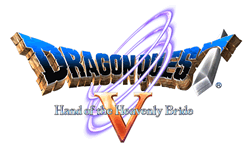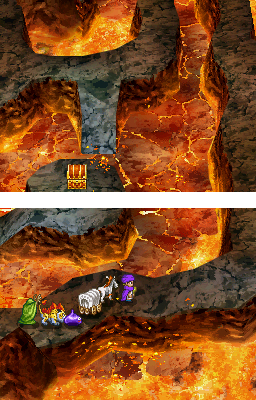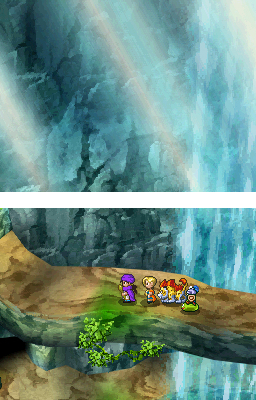|
|

|
PLATFORM
|
DS
|
BATTLE SYSTEM
|

|
INTERACTION
|

|
ORIGINALITY
|

|
STORY
|

|
MUSIC & SOUND
|

|
VISUALS
|

|
CHALLENGE
|
Easy
|
COMPLETION TIME
|
20-40 Hours
|
|
OVERALL

|
+ Story still feels original
+ Plot moves quickly
+ Party members have lots to say
- Easy, repetitive combat
- Random Battles
- Save only in church
|
Click here for scoring definitions
|
|
|
I've never been a huge fan of the Dragon Quest series. Like most westerners, I'm more partial to the steampunk, WMD-shaken worlds of Final Fantasy than I am to the heaven and hell Jesus-with-a-sword allegories of Dragon Quest. The Dragon Quest worlds often seem bizarrely quaint for a fantasy setting, almost like a Japanese game designer got inspired by touristy little villas in the European countryside and decided to make an RPG.
Still, I was eager to try Dragon Quest V: Hand of the Heavenly Bride. The game was originally made in 1992, and only now, seventeen years later, is it seeing its first English-language release as a remake. Remarkable, considering the game is supposedly series creator Yuji Horii's favorite game he's made, and this is the guy who worked on Chrono Trigger. I can't say how the Nintendo DS remake stacks up to the older versions, but I can say this is still an excellent game.
Heavenly Bride's weakest link is its battle system. Every JRPG veteran has had the conversation where someone asks how they should control their characters in combat, and the answer is: Select "fight" until you're low on hit points, then heal yourself, and then "fight" some more. Dragon Quest V is the epitome of the too simple for its own good combat system. Anyone who's played Dragon Quest VIII on the PS2 knows that the battle system can reward skill and have plenty of turn-based strategy. This is not one of those deep battle systems. It's a battle system for folks who don't really enjoy strategy in their RPGs and just like to get things over with.
There's tweakable AI that can take over if you get bored. Turns play out with each party member and monster attacking in the order of their speed stat. The cute and quirky monster animations look great, but like all Dragon Quest games, animations are minimal, with the player's unseen actions described within text boxes which unfortunately can't be skipped.
By the end of the game, you'll have a library of spells and a bag full of magical trinkets, but the best strategy will still be healing when necessary and selecting "fight" in your free time. Attack spells are underpowered and worse than that, they take up tons of MP which should probably be used for healing or one of the game's two or three useful buff spells, which will have to be cast over and over again in boss battles. There's a little more challenge toward the end, but it comes from fighting through several long battles without a chance to save. The bosses themselves have predictable patterns, but I couldn't help feel some tension when I realized dying would mean losing over an hour of play time spent repeatedly selecting the fight and heal commands.
It's remarkable that the game still manages to be fun, despite its dud of a battle system. In recent years, RPG developers have increasingly experimented with combat systems borrowed from many different genres Ð FPS games, puzzle games Ð and it's become a popular truism that the gameplay of an RPG depends upon its combat system.
In Dragon Quest V, the gameplay is much more centered on the player's exploration of the world. Dungeons are full of surprisingly outside-the-box puzzles, the world map is openly explorable early on, and in town the player pieces the story together one fact at a time, detective style, by talking to each villager while ransacking their houses for medical supplies and gambling vouchers as they look on helpfully. When the original game released in 1992, cut scenes hadn't yet become the exclusive way to advance the story of an RPG, and here they're reserved for the dramatic climaxes. Most of the story in Dragon Quest V is there to be discovered as the player wanders around and talks to anyone he can find. This gives the game a unique feel to those of us used to story scenes that tell us exactly where to go and blinking minimaps that remind us just in case we get lost.
 Dragon Quest: The Oregon Trail
Dragon Quest: The Oregon Trail
|
|
It's a testament to how well designed the game is that despite this feeling of free exploration, I only felt lost at one point, toward the end.
The exploration itself probably wouldn't be so entertaining if the story wasn't compelling. On the surface, Dragon Quest V is a rehash of the standard fantasy clash between good and evil. The game features a standard dark lord and has a cast of villains who get very little character development. But they never seem entirely silly, because for most of the game evil is so powerful and organized that the story is more about surviving and finding a way to live your own life than it is about saving the world. Underneath the generic dark lord veneer, Dragon Quest V is an epic about a family's struggle for survival. When the final battle does come, the pressure is on, because it's hard to imagine dying after everything you, your family, and your friends have been through.
The story opens with your birth. When you're a child, the game plays like a slightly skewed fairy tale, and lulls you into thinking you're playing a very simple and formulaic RPG. Details abound that make you feel what childhood is like in the world of a JRPG, with a father who constantly casts heal every time you lose a hit point, and bookshelves that constantly remind you, when searched, that you can't read.
Then, suddenly, everything changes. The game shocks you out of that fairytale illusion, and for the rest of the game you feel the loss of that childhood, which adds a poignancy to the rest of the game rare to epic fantasy and RPGs.
As an adult, you gradually come into your own, and as you level up and adventure the game gives you a sense of purpose that feels unusually personal. You also have to make an important decision in adulthood, which I won't spoil here. I will say it affects the story for the rest of the game, and makes this a game more worth replaying than most.
Early on in adulthood you get a wagon, which is more important than it sounds. With the wagon comes the ability to recruit monsters. The monsters fight alongside you with their obscene monster skills and level up just as any other party member would. Some shops even carry weapons and armor for them. It's a well-designed system and especially impressive considering the original game predates Nintendo's Pokemon by several years. While you'll never have more than a few human companions, your harem of monsters will follow you around to the ends of the earth, and they will look cute doing it. The monster system also manages to redeem the battle system to a degree, because picking your lineup of monsters can be a very strategic process.
Pacing is excellent. Anyone who prefers the short and to the point scripts of 2D RPG classics like Final Fantasy IV and VI will be happy, and probably enjoy the narrative style and pace more than most recent RPGs. The story covers a thirty-year period in about thirty hours of play time, less if you're fast. It moves from life-changing scene to scene so quickly that you always know something major is going to happen if you keep playing for another hour. The script is clearly a recent Square Enix translation, with almost no awkward grammar and a lot of effort spent to bring the entire Dragon Quest world into English. Some of the dialects given to characters work, and some should have been left out, like the two characters who are so dominated by their Mexican or Italian accents that you start to wonder what they said in the original game.
The "party talk" feature is a major highlight. With a press of the B button, at any time out of combat, one of the characters who is following you around will comment on what's going on. Press the button again and a different party member will chime in. What makes talking to your party members so entertaining in Dragon Quest V is that they don't feel like automatons. This is managed in one simple way: the variety of what your characters have to say is exceptional. They'll say something new after every villager you talk to, and every area you enter. Often the change from day to night as you explore the world map reveals new dialog, or just entering a building in town will make party members say something different from when you actually talk to the people inside the building. In many dungeons, your companions will say something new on every level of the dungeon -- this works really well in towers where you're quickly climbing up or caves where you're climbing down, and the dialog builds tension as you explore.
 Purdy.
Purdy.
|
|
There are Dragon Quest conventions that will annoy some players. The game has plenty of random battles. The player is also only allowed to save in churches, which is pretty out of style these days, but those two mechanics do add an old school tension the combat itself lacks, and everything is balanced well around them. Dying will rarely mean you lose even half an hour of progress, because dungeons are kept short, or allow you to loop back to the beginning quickly, to avoid frustration. Think of it as a survival horror game with slimes, where the random encounters wear your party down and you watch your magic points slowly dwindle, so that when you're five floors deep in the cave, you start to ask yourself: Do I feel lucky, or do I run back to the nearest church and save before I fight the boss?
The remake does include a few significant modernizations, like a "heal all" menu option, which uses the most efficient healing spells to bring everyone up to full life in about 2 seconds. It makes the random battles less wearisome, and helps streamline the exploration.
The graphics engine has been totally redone. Character sprites drawn in 2D move within a 3D world which can be rotated in most areas by holding down the L or R buttons. Playing with the camera is useful when it's allowed in dungeons, and sometimes really pays off in town -- there's even one town set up like a maze. The environment fits so well with the characters that it's easy to miss the dimensional discrepancy, and the 3D graphics blend in and don't give themselves away by being blocky, an accomplishment on the DS, even for Square Enix. The top screen of the handheld displays the game world continuously with the bottom one, and there are some memorable areas like waterfalls and mountain views that make use of the whole vertical panorama.
In battle, the character and monster art is unpixelated Akira Toriyama, artist of Dragonball fame, which may annoy those who don't care for the classic anime-meets-Neanderthal-foreheads-look. The style does fit the world, though, and the turban and cloak wearing main character is a memorable design that fits the role of a lifelong traveler well.
Most of the music of Dragon Quest V is very much the same you've heard in any other game in the series. There's church music, zany town music, classic battle music, and the heroic Dragon Quest theme song.
I found myself liking the music more and more as I got past the series' standard soundtrack and started hearing the game's unique songs. There are some great tracks which aren't revealed until pretty far into the game, and they stand out from other JRPG music by sounding very classical Ð one track sounds like something out of Mozart's The Magic Flute, but doesn't seem out of place in the game.
The sound quality is limited by the DS speakers, which as usual are disappointing tinny. This complaint, luckily, can be forgotten with headphones. The sound effects fare better through the normal speakers, since they're meant to be as reminiscent of the NES as possible. If you've ever played an RPG from that era, you know what kind of sound effects this game contains. The bleeps and bloops remain true to the original, and are not recommended for extended play in public areas. No voice acting has been added in the remake.
Hand of the Heavenly Bride does a good job of using the quirky Dragon Quest fantasy style as a bright and engaging backdrop, which makes the central drama about human struggle and lasting friendship more striking in contrast.
Outside of combat which is too easy, the game offers fun puzzles, exploration, and an exceptional story which still remains unique seventeen years later. Anyone who loves the SNES era Final Fantasy games may find a new and unexpected favorite. Anyone who can stomach random encounters should give it a try.
Review Archives
|









